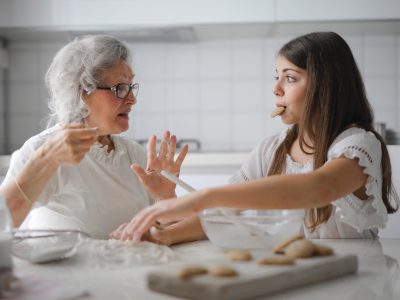How to Feel Young and Embrace Aging Gracefully
- Are you 32 and scared of getting old? Experience a lot of nostalgia?
- Ever heard of fear of aging phobia? Dealing with aging as a woman?
- Do you want to find ways to promote feeling young throughout your life?
A survey of 2088 adults in the U.S. showed that 87% reported FOGO, fear of getting old. Such fears include decline in physical ability, memory loss, chronic illness, running out of money, and dying. Not surprisingly, almost anything to do with aging is negative. Apparently our youth obsessed culture is anti-aging.
Indeed many people chase after the idea of “feeling young.” Society constantly pushes for people to look more youthful and to buy products that can “help them reverse any sign of aging.” Although this all sounds great, this idea can cause problems for people as they grow older. Things like anti-aging beauty campaigns or negative connotations surrounding being old can produce harmful messages. People may unfortunately start to really fear getting older and even resent their birthdays.
Feel Young vs. Fear of Aging
Feeling Young Isn’t Everything…Right?
Many people romanticize their younger years and look back on them as the best of their life! Some people consider their younger years to be “their glory days.” They look back on their college era or their twenties as times when they were youthful, restless, motivated, and constantly having fun! Often, these people look back at their life in a very nostalgic way.
According to the APA, nostalgia is a feeling of longing to go back to a past time. During this time, the person usually considers their life to have been happier or more meaningful. Research suggests that nostalgia can benefit people in many ways, from people who have dementia to people who experienced negative effects during the pandemic. Thinking about positive memories and experiences helps make people feel less lonely and happier.
However, some people may feel sad when thinking back on their past. They may not be happy in their current state of life, and looking back at their past makes them feel like their happier times are past them. Yet they usually romanticize the good old times and do not pay much attention to the problems once faced. People can start feeling depressed and dissatisfied in life.
When Feeling Young Takes Work
Feeling young is a great feeling. Young people having fun, acting carefree, being taken care of, etc. Unfortunately, some people didn’t have easy childhoods or teenage years. These people may have faced:
- Unstable living conditions
- Divorce or separation of their parents
- Abuse or neglect
- Bullying
- Pressures being put on them (from their families, schools, social media, etc.)
- Discovering or struggling to come to terms with their sexuality and/or gender or losing social support for being who they are
These people can benefit from healing their inner children. As mentioned in our past article, inner child work is all about comforting the child you once were. Inner child work focuses on healing from the pain of the past. The child who was once scared, alone, forgotten, or hurt can now be seen and embraced. Check out our article about healing your inner child to learn more about accessing this process in your life.

Beauty of Aging – Feel Young at Different Phase of Life
Many people miss out on the true beauty of aging! Aging is a wonderful opportunity to grow wiser, experience so many different parts of your life, and unfold your life’s journey. As we grow, we make connections, learn so many lessons, influence other people’s lives…the list of positives keeps going on and on!
We can learn so much from each phase of time: past, present, and future. There are many times when people mourn the past, feel detached from the present, and worry about the future. Learning to embrace these stages will help you feel more content in life. Take the past and learn from it, but allow yourself to live for the present. Correspondingly, allow yourself to run towards the future with open arms – dismiss the negative feelings towards aging. We all get older, it’s a natural part of life! Try embracing this idea more than rebuking it.
At any age you can benefit from tapping into your youthful spirit! Accessing this youthful spirit can help us feel more optimistic and excited for life – a Harvard study even states that feeling young at heart can help people live longer and happier lives! Even as we get older, we can still do things that help us feel young!

How to Feel Younger and Embrace Aging Gracefully
We will go over 10 Ways to Feel Younger and Heal Your Inner Child! Feeling young can help us appreciate the past, look at the present with more vitality, and have a kid-like excitement for the future (like how you used to feel when dreaming of becoming a princess or walking on the moon). If you are interested in learning more, keep reading!
1. Allow Yourself to Dream
Kids are always dreaming about different things in life. They imagine becoming royalty, slaying dragons, and being the heroes of their own stories. We can find inspiration through these ideals!
“Becoming Royalty”
The idea of “becoming royalty” can translate to wanting success and the good things in life. We may not always be able to access the finer things in life, but we can try to bring more gratefulness towards what we have! Many people (especially in the age of Tik Tok and Gen Z) try romanticizing their everyday lives. This helps us appreciate the smaller things in life and look for beauty in tasks we usually wouldn’t think of in that way.
For example, think of studying at the library. You may usually feel annoyed with this task, but try looking at it from a different perspective. Think of yourself as enriching your mind and furthering your knowledge. Study in a relaxed cafe or aesthetically decorated room to improve the ambiance and overall feeling.
“Slaying Dragons” and “Becoming Heroes”
This idea relates to our goals of overcoming our obstacles. “Slaying dragons” can symbolize our desire to heal from past traumas and further our journey to recovery.
We become our own heroes each day as we take care of ourselves physically and mentally. This idea can manifest by saying “no” and prioritizing our needs or moving on from situations that do not serve us anymore.
2. Be Inquisitive
If you are around younger children, you will notice that they ask A LOT of questions. Kids are very curious and desire to learn more and more each day! Try to channel your “inner investigator” as kids do!
Ways to Act as an Investigator
- Ask questions and invoke wonder: Learn about different topics and subjects. While doing so, keep asking “why?” or “how?”! If you learn a particular way of doing something, see if there is an alternative method you can try. Always expand your perspective and look at situations from multiple lenses!
- Know that there are no dumb questions: No one should ever make you feel stupid for wondering or asking a question! Recognize that your voice and opinions matter!
- Allow others to ask you questions to YOU and help them when necessary: Through all your investigations, you may become really knowledgeable about specific topics- others can pick up on this! If you want to help share this information, let people ask you questions and help them learn.

3. Have Fun (and Don’t Be Too Serious)
Let loose and channel your inner youth by allowing yourself just to have fun! Working too much can lead to burnout – work-life balance is essential in preserving inner peace and wellness.
Take up a fun hobby, do a workout class, go out to lunch with friends, try karaoke, and allow yourself to feel joy in the present moment.
Kids also don’t usually take themselves too seriously – they can be goofy and carefree! You may feel like you’ve gotten more (to be blunt) boring or fear other people’s opinions. Challenge yourself to venture out of your comfort zone and be adventurous like kids often are! Allow yourself to do new things, even if you feel silly.
4. Have a Beginner’s Mindset
Jon Kabat-Zinn created Mindfulness-Based Stress Reduction (MBSR). There are 9 popular attitudes associated with MBSR. Practicing Mindfulness can help improve your relationship with your life, yourself, and others.
One attitude of Mindfulness is the Beginner’s Mind. As mentioned in our past articles, this attitude helps people appreciate the newness of each moment. This way, when learning, you will be more open, have fewer expectations, and learn from those around you.
Young people are often beginners (whether it’s a young kid starting Little League Baseball or a young adult starting an entry-level job). Try and look at new chapters or experiences in your life as an excited beginner, ready to learn as much as you can and embrace any mistakes you make on the way (it’s only natural).
5. Be Open to Making Friends and Connections
Young children can be very social! Kids often go up to other kids on the playground and ask to play or run around together during playdates. As kids get older, they become teenagers. Teenagers value their friendships deeply and benefit from them. Continue making connections with people even as you grow older.
Try your best to keep in touch with friends, join social groups (intramural sports teams, book clubs, parent organizations like PTA or PFLAG, etc.) There are so many ways to keep making friends and meeting new people!

6. Start a Hobby or Collection
Young people are encouraged to explore their interests through things like hobbies and collections. Hobbies help you engage is activities you enjoy or are passionate about. Having a collection can help people de-stress and feel comforting feelings of nostalgia! You can start learning to knit or curating a collection of vintage toys (the options are limitless)!
7. Learn from Older People
Kids need help and guidance from the adults in their life. We can learn a lot from the generation(s) before us. If you have good older relatives in your life, take time to listen to their stories, hear their wisdom, and receive any advice they offer.
Unfortunately, you may have already lost your grandparents or are dealing with the hard reality of your parents getting older and losing them (learn more about this topic in our article here). If this is the case, you can also try to volunteer at a Veterans Association or nursing home. Through these experiences, you can give back to people and maybe even make some new connections.
8. Stop Fearing the Aging Process
As mentioned in our past article, women as young as 25 will start fearing the impending doom of getting older. In a report by Cameron et al., researchers say that many women find aging difficult. Society plays a significant role in this pressure especially put on women, and it’s not fair!
Most kids dream about growing up! They can’t wait to be a “grown-up” and experience this new, exciting adventure. When did we stop looking at aging as an adventure? Why can’t we all still think of getting older with a child-like excitement?
Challenge yourself to channel your inner child: instead of bringing yourself down for aging, live these chapters of your life with the idea that you are making your younger self proud!
9. Start Healing Your Inner Child
Provide the comfort and support to your inner child that they always deserved! Remember that this healing journey can also involve healing your inner teenager. Make these past versions of yourself proud and appreciate them for making you the person you are today. Read our helpful article to learn more about this topic here.
10. Ask for Help
Kids need help and usually aren’t afraid to ask for it. We know that asking for help makes some people feel vulnerable or scared. Know that it is never weak to turn to support. It actually is an act of true strength and self-love. Take care of yourself like you would tend to a kid in-need.
Therapy, like CBT, helps people manage and cope with depression. The treatment gives people a safe place to talk to a mental health professional. This person understands what you are going through and empathizes. You will gain helpful tools and skills to improve your life. Also, therapy can help people heal from past trauma and start their healing journey.
If you face any feelings of depression, know that support is available! Our team at Mind Connections wants to help you. Call us now to learn more or book an appointment!
Resources of Mental Health
If you feel very depressed, suicidal, and need support, know that help is out there. Below are resources:
- National Suicide Prevention Lifeline: 800-273-8255
- National Suicide Prevention Lifeline’s Website: https://suicidepreventionlifeline.org/
- SAMHSA’s National Helpline: 1-800-662-HELP (4357)
Content Creator, Victoria Gallo; Reviewed by Dr. June Cao


